My Life Story
By Jack L. Wilson
Living in Putnam County, Indiana is quite natural for me as my great-great grandfather Alexander Wilson, Sr. was one of the early settlers of the area now known as Floyd Township northeast of Greencastle. Alexander, with his family, arrived in Putnam County sometime during the summer in 1827. During the 1820 census, he was in Washington County down in the southern part of the state having moved there sometime after his marriage to Sarah Lucas of Shelby County, Kentucky in 1813. Alexander was a veteran of the War of 1812 having been mustered up twice for brief periods of service in Kentucky Volunteer outfits attached to General William Henry Harrison?s army in the fights against the English backed Indians. It is believed Alexander was born in Kentucky around 1792, the son of another Alexander Wilson, born circa 1755 in Kentucky. This line of the Wilsons is of Scotch ancestry. Sarah Lucas was of German-English ancestry.
?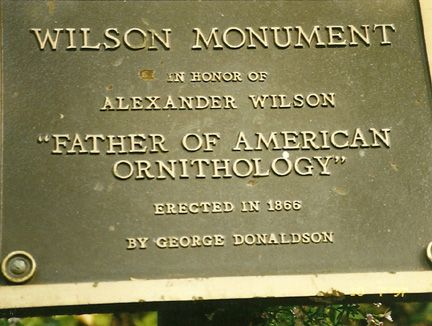
Wilson monument in honor of Alexander Wilson
My great-grandfather, Alexander, Jr. was born in Putnam County in 1829, the sixth child of Alexander and Sarah, and the third to be born in Indiana. Less than two years later, the seventh and last child of Alexander and Sarah was born.
?Not a great deal is known about Alexander, Sr. Courthouse records in Greencastle indicate he was literate, as several documents show his full signature, rather than just a witnessed sign. Sarah, on the other hand, as was the custom at the time, was illiterate. At least in so far as she couldn?t sign her name.
Alexander farmed a fair-sized farm up between Fillmore and Coatesville in northeast Putnam County until his death in 1860. Sarah stayed on the farm until her death in 1876. Alexander, Sarah, and several of their children and members of their children?s families are buried in New Palestine Cemetery which is between Bainbridge and Groveland on the Old Groveland Road.
Alexander, Jr. (my great-grandfather) was married at an early age to Jarusha Minter (of predominantly English ancestry), but left her before my grandfather, James William Wilson was born in 1847. Grandfather was raised primarily by his mother?s family as a whole, even though they lived just a few miles apart in Floyd Township. It is believed that Alexander, Jr. died about the turn of the century, and is probably buried somewhere in Putnam County.
?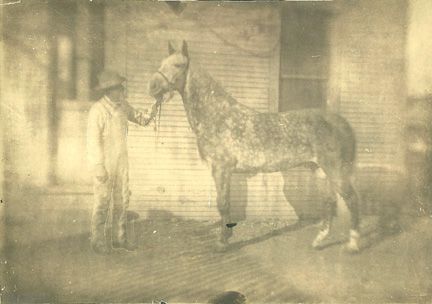
James William Wilson
James William moved around central Indiana and Illinois most of his life. He worked as a farmer, a lumberman, or a teamster most of his life. He was married first to Sarah Hayden in 1871. Sarah bore him two sons, Otis and Ernest Theodore. Otis died in 1940 in Indianapolis, and Ernest died in 1899 at the age of 24. Noting more is known about Sarah.
James married his second wife, Mary Elizabeth Middleton, in 1899. Mary was born in Canada and was of English ancestry. Of this union, there were five known children, although records indicate there was a sixth child, possible still born, who was probably the oldest child.
?
James William and Mary Elizabeth Wilson
My father James Francis (Frank) was the oldest known child, being born in 1882 in Arenzville, Illinois. Two other children were born in Illinois before James William moved back to Indiana, where the last two children were born.
It is believed that Mary Elizabeth?s grandfather was a British soldier of the line in the War of 1812 in Canada.
My mother?s great-grandfather, Robert Wiseman, was born in Ireland between 1750?1760. There he grew up, married, and had started his family prior to coming to this country before 1800. In 1800 Robert and his family were living in Wilkins Township in Allegheny County, Pennsylvania. This is now part of Pittsburgh.
My mother?s grandfather, John Wiseman, was born in Pennsylvania in 1806. There he grew up, married, and begat at least five children before moving to North Vernon in Jennings Couth, Indiana sometime between 1850-1860. John was a carpenter by trade and my grandfather, Theodore followed in his footsteps.
Theodore was a veteran of the Civil War. The Indiana Volunteer outfit he was assigned to was a part of the army General Sherman took through Georgia.
In 1880, Theodore married my grandmother, Mary Elizabeth Tiffany. Mary was born in Piqua, Ohio and was descended from a long historical Tiffany line that started in this country in the early 1600?s when Squire Humphrey Tiffany emigrated from England to America.
?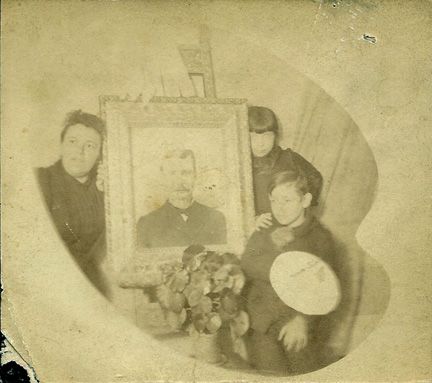
Funeral picture for Theodore with widow Mary Elizabeth, Gertrude, and Chauncy
My mother, Gertrude Amelia, was the second of the three children born to Theodore and Mary. She was born in 1883 in North Vernon, Jennings County, Indiana. Her father was killed in a bridge construction accident sometime around 1895.
After reaching maturity, Mother (who was a gifted musician) traveled with Sells-Floto Circus and played in the circus band until about the time she married my father in 1911 in Indianapolis.
?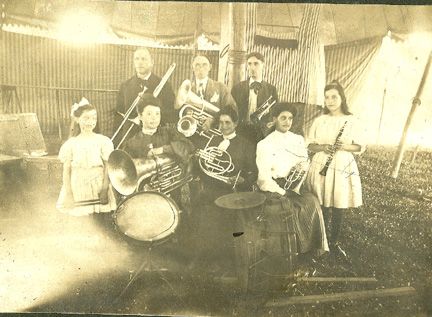
Gertrude Wilson on left with French horn
My father was a mechanic, first on bicycles, then on motorcycles and automobiles as they developed. Because of his mechanical skills he was utilized by some of the early automobile manufacturers to move from town-to-town and train the mechanics at dealerships as they were being set up before and during World War I. He started with Chalmers and moved to Maxwells when the companies merged. After World War I he went on to Chrysler products starting in 1924 when W.P. Chrysler, having married a Maxwell, merged the companies.
?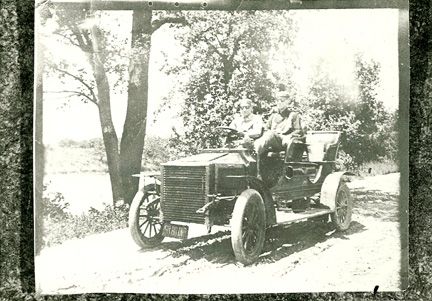
James Francis Wilson on left
Two years after being married, Frank and Gertrude?s first child, James Francis, Jr. was born in Lafayette Indiana in 1913. A little over a year later, Junior died in Cheyenne, Wyoming where Dad was then working.
?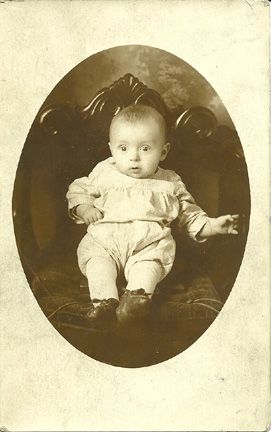
James Francis Wilson, Jr.
Shortly after Junior died, Dad and Mother moved on to Salt Lake City, Utah where Dad started training the mechanics at the Taylor Motor Car Company, a new dealership. My sister Viva Elizabeth (Beth) was born there in 1916, and my sister Hazel Adele in 1917.
?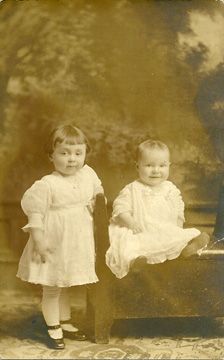
Viva Elizabeth (Beth) Wilson and Hazel Adele Wilson
Being married with children, Dad was exempt from the draft in World War I. He had made an attempt to enlist during the Spanish-American Was by lying about his age but his father took the train to Miami, Florida, and caught up with him on the dock before he could board ship.
I was born 30 January 1919 during what was later described to me as the worst blizzard in history in Salt Lake City. (Jerry and I were in an equally bad blizzard in 1980, but that?s another story.) Legend has it that Dad could not get home from work when I was born because of the blizzard, and the doctor could not leave our house after I was born.
?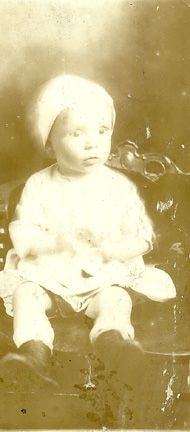
Jack Lloyd Wilson
Since I was only two when we left Utah and moved to Los Angeles, California in 1921, actual memories are debatable. There were two events though that I seem to remember. One, we had gone to one of the resorts at the lake. I recall it had an enclosed swimming pool with seats, or bleachers built up around it. Hazel fell down the steps and into the water. Because of the high saline concentration she didn?t sink, but rather floated until Dad could get to her. Later research indicated the resort was probably Saltair just south of Salt Lake City. Secondly, Mother and we three children took the train to Los Angeles. (Dad and a couple other men drove out.) As the trains left Salt Lake City, they traveled on a trestle around the edge of the lake. A train coming in from the West had an accident and the engine jumped the track and was hanging part way into the water. After an appreciable delay, the train we were on was allowed to creep by the other train, and I vividly recall looking out the window and seeing the order train?s engine hanging at an angle part way into the lake.
Dad later recalled some of the ?fun? they had driving out to Los Angeles in an old brass-radiatored Model-T Ford. In fact the road was so bad in one place, the radiator actually jolted off the car. In any case by the time they got to Los Angels that old Ford was literally held together with baling wire.
Sometime before we left Salt Lake City, as I found out later, I had fallen off the front porch of the house where we lived and hit the corner of my right eye on the corner of the step. This triggered amblyopia and caused the right eye to cross in, thereby forcing the left eye to do all of the work. The doctors apparently had my parents put a patch over my left eye for extended periods thereby forcing the right eye to do some work. Unfortunately, the doctor in Los Angeles later discouraged the practice, and said that glasses alone would both straighten the eye and force it to work. Time proved that glasses would straighten the eye all right, but would not force it to work. Consequently from the age of four, I have worn glasses continuously.
We lived in Los Angeles for about three years. During this time period, I remember several things to this day.
?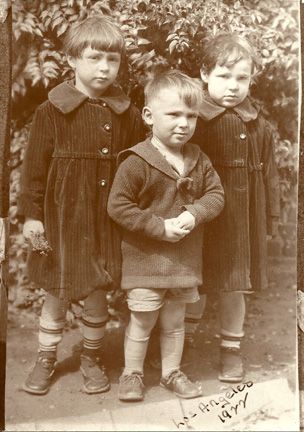
Hazel, Dad, Beth in Los Angeles
One, we were living in a double house on Adair Street when a rather severe earthquake struck the area one night. Beth, Hazel, and I slept in a trundle bed pulled out from under the bathroom. The tremor rolled the bed back under the bathroom and slammed the doors behind it. We three children lay there giggling while Mother was hysterically trying to find us. Dad finally calmed her down and pulled the bed back out into the room. I recall the next day driving and/or walking around with either Dad or Uncle Cecil looking at the damage from the earthquake. Later we drove up to Santa Barbara where the damage seemed to be extensive.
Another time I recall we were playing out in front of the house when it started to rain. Mother couldn?t figure out why we came I because where she was working at the rear of the house, she could see the sun shining on the back yard.
I recall Mother and Aunt Betty making mincemeat prior to Thanksgiving one year. I probably recall this because they made a large dishpan full. It was then covered and put in the closet to ?age.? Dad and Uncle Cecil were going to be ?macho? and go hunting for a wild turkey. Not being successful, they came home with a live domestic turkey that they tried to palm off as being wild. I vaguely recall that it didn?t work.
?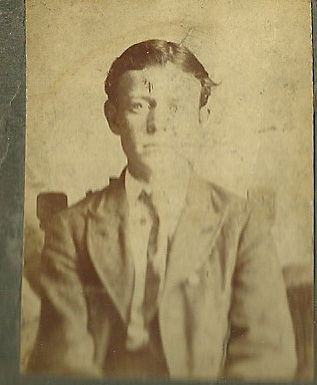
Cecil Wilson
Aunt Betty (Uncle Cecil?s wife) drove an electric car. As I recall the arrangement of the steering lever, the doors, etc., it was probably a Baker. I remember going for several rides in that car.
Once Aunt Betty took we children to some kind of party where we all received a gas-filled balloon. Walking down the street, I accidentally let loose of the string and my balloon sailed off into the wild blue yonder. To quiet my tears, Aunt Betty bought me a large bag of animal crackers which I managed to consume most of myself.
During our sojourn in Los Angeles, we made several trips to Bakersfield to visit the Schofields. They were related in some way to Dad?s Grandmother Minter?s family. This entailed driving over the old Ridge Route across the Tehatchapis. The old Ridge Route was noted for a fantastically high number of twists and turns in about 30 miles. (I?ve heard numbers in the hundreds. But that was probably exaggerated.) In any case, for reasons then unknown, but now readily explained since doctors discovered I have been without a right vertebral artery since birth, I got horribly carsick both going and returning. I recall there being a stone bridge at one end of the stretch of turns, and a guard rail at the other end which if he was lucky Dad could reach before I had to toss my cookies.
Either at Christmas or for my birthday the year before we left California, I was given a military drum which became my pride and joy. Unfortunately when we packed the car for the trip back to Indiana, there was no room for the drum, and it was given to one of the neighbor boys.
It?s hard to describe how the car was loaded for the trip. First off, it was a Chalmers touring car. (I think Dad said it was a 1919) with button or curtains for the side windows. Even though the top could be folded back (like a convertible) I don?t recall Dad ever doing that. In any case, there were low expanding luggage racks that bolted onto each running board. They were low enough so that the door could still be opened when they were installed. As I recall, however, the running board on the driver?s side was stacked too high to open the door and everyone had to get in and out from the passenger?s side. In these racks were placed such things as suitcases, blanket rolls, a half tent that when set up enclosed one side of the car, and other miscellaneous items. Since there had to be room for Mother and Dad in the front seat and we three children in the back seat, there wasn?t a great deal of room for a whole lot extra. I do seem to recall that every available nook and cranny was filled, however. A canvas water bag was lashed somehow to the outside of the car just in front of the driver?s seat. There were two spare tires lashed to the back of the car instead of the usual one. Tools. etc. were under either the front or rear seat cushions which were removable.
Dad had a new straw hat that he had slipped between two of the straps supporting the roof. Not too far out of Los Angeles as we were crossing the Mojave Desert, Dad suddenly hit a dip in the road. I had been laying back in the seat kicking my feet in the air when Dad hit the dip. I became airborne and one of my flying feet neatly kicked the top out of Dad?s straw hat.
?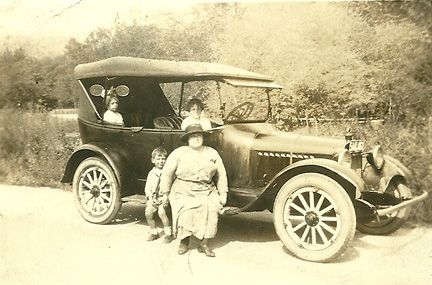
Beth, Hazel, Dad, their Mom
The trip was somewhat uneventful. We went by easy stages through Las Vegas; Salt Lake City; Cheyenne; North Platte, Nebraska; Davenport, Iowa, and on into Indianapolis. We either stayed with relatives or friends along the way or camped out.
I remember the stopover in North Platte for two reasons; the man?s name was Jack, his son?s name was Jack, so I became little Jack. Secondly when we left we children were each given a package of gum. I remember mine was Black Jack Licorice. Not far out of North Platte after chewing the whole pack at one time, I got tired of chewing that horrendous wad of gum. Since we had been taught never to throw unwrapped gum out by the roadside (although what difference it would have made in Nebraska escapes me), I borrowed a handkerchief from Mother, wadded the gum up in it, and threw the whole thing out the window. I don?t think Mother was too pleased.
Later on we pulled into a campground one night in Iowa. It was pouring rain, and the entrance was down a small grade. Sliding down Dad found a place to park. Since it was raining so hard, the tent couldn?t be used, so we five of us slept in the car. Fortunately, it stopped raining during the night and a strong wind came up that helped dry some of the mud. Consequently, by getting a running start, Dad was able to slip and slide back up the road the following morning.
Along about this time in the trip, and again towards dusk, Dad was trying to reach some small town before stopping for the night when we saw what appeared to be a big tree branch in the road to late to stop, so we ran across it. Stopping the car, he went back to throw it out of the road before someone hit it. I faintly recall he returned quite hastily, jumped into the car and took off like the hounds of hell were after him. He told mother it wasn?t a tree branch, but instead a large snake that spanned the road from ditch to ditch. When we stopped at the next town he found that a large python had escaped from a carnival a couple of days before. I?m not sure the carnival owners appreciated Dad running over and killing their biggest attraction, however.
The trip on into Indianapolis was made without any other events sufficiently interesting to a five year old to remember.
Dad kept a log of the trip in his address book and some of the entries are quite interesting. For example, the trip was exactly 2,800 miles, and the old car used 171 gallons of gas for which Dad paid a total of $38.35. In addition he bought 9 quarts of oil for a total of $2.45. The total of other expenses was $33.25 and included such things as 2 tires for $16.00; one water bag at $1.45; and another replacement bag and can for $2.45. A spring for the car was replaced in Salt Lake City at a cost of $6.00. Campgrounds ran all the way for $.25 to $.50. Oh yes, a radiator ornament cost $.75. Some place shortly after leaving Los Angeles, Dad splurged and spent $1.15 for refreshments.
Arriving in Indianapolis, we soon fell into the habit of frequently moving. For some reason, Dad did not like to stay in one house any length of time.
Marian was born in February 1925, and Mother died of a cerebral hemorrhage that October. Things were never the same again. Marian was placed in a foster home, and never lived with the rest of us. Beth, Hazel and I were placed first in a home with a nice couple named Nichols where we stayed for a while. Mr. Nichols was a ticket-taker at the Lyric Theatre in Indianapolis so we got to a few free shows. After just a few months with the Nichols we became residents of the Day Nursery in Indianapolis. Like a large number of other ?guests? we were full time residents. It was while living there that I started school, good old P.S. #5 and it was during this period that the things that usually happen to everybody started happening to me. Things like having a Model-T Ford come around the corner as I was coming ?home? from school one afternoon and knocking me down. The policeman who was directing us across the street had to chase me a full block to the nursery to find out if I was hurt. (I wasn?t.)
A year or so later, Dad married again. His new wife was a widow, Maggie Kivett Wolfe, who also had four children. Now the fun started. Her third child, Louella, was Beth?s age. The youngest, Josephine was about Marian?s age. The other two were older. There was always friction between Beth, Hazel, and Maggie?s daughter. So much so that as soon as they possibly could, Beth and Hazel moved out and lived with fairly well to do families as part time companions and part time domestics. I stayed home because of Dad, but it wasn?t always easy. My 1931, I had managed to get bit by a rabid dog and had to take the Pasteur treatment of 21 shots in the abdomen; one a day for 21 days, among other things.
?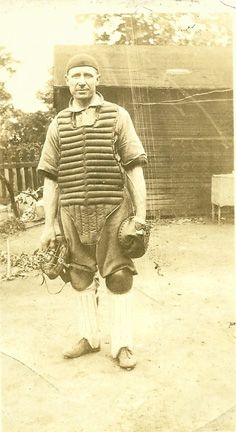
James Francis Wilson
But what really started during this time period was my evolution as a loner. When I couldn?t be with Dad, I was alone to walk the streets, play some lot ball, roam the alleys in search of junk, walk innumerable miles, or read. I would read anything with printing on it, even picking up pieces of paper and reading them. I made no lasting friends, but rather the opposite. I was the little 4-eyed Wilson kid. My happiest times were when I was with Dad; walking out to the park to see a baseball game, or just walking with him. Until the depression started in 1929, Dad played semi-pro ball for the company he worked for. He was an excellent catcher, and had played with many of the future major league stars. He had progressed up to Triple A Ball with both Beaumont of the Texas League and Milwaukee of the American Association, but was prevented from going on to the majors because of his size; he was only 5?8? and 152 pounds. He was a better defensive catcher than Mickey Owens, and a better hitter then Wade Killefer, but he was just too small. The then New York Giants did have his contract in perpetuity though. I spent many an hour playing catch with Dad, honing my pitching skills which got me a tryout with Terre Haute of the Three I League when I graduated from high school in 1935. Three I was an AA league at that time and Terre Haute was a New York Giant team. So like Dad, I was under contract to the Giants. Unfortunately, after just part of one season with Terre Haute in 1935, I hurt my arm and brought may career to a screeching halt. I don?t know who was more disappointed, Dad or I. I did manage to play semi-pro for a few years after that. But I still remember time after time going out to the Ball Park in Indianapolis where Dad would introduce me and talk with old timers he had known; new managers, or coaches, on their way out. I enjoyed the few games I ?pitched for Terre Haute though. Since I was only 16, I couldn?t go on any road trips, but was restricted to home games. I would get up early in the morning, throw my glove in a satchel, walk down to the Greyhound station, plunk down my $1.50 for a round trip ticket and spend an hour and a half each way to Terre Haute. Suit up, practice with the big boys, and take my turn in the pitching rotation. The money was fantastic; $10.00 if I started a game, $15.00 if I pitched a complete game, or $20.00 if I won the game. Sure fun while it lasted.
Backing up a little, I recall the tornado that hit Western Indianapolis about 1930. We were living on Belleview just south of 10th Street at the time. Maggie was racing around shutting windows and doors, and I was racing around after her opening them in an attempt to equalize the pressure. The west edge of the tornado came down the alley behind our house, knocked down all the sheds on our side of the alley until it got to ours, jumped over it and took all the rest for the next block or so on our side.
Dad still kept up the habit of frequent moves. For example, from 3rd to the 8th grade for me, we lived in seven different houses, but I stayed in the same school. The four years I was in high school, we lived in three different houses.
?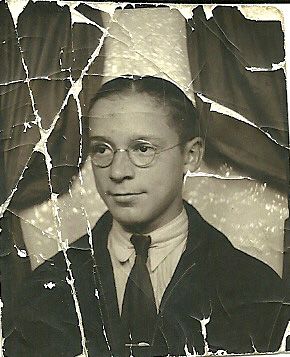
Dad at 16
As you can tell from my graduation picture I was quite small when I started high school in 1931. I was only 4?8? and weighed almost 85 pounds. In fact, I was insulted by the high school football coach, Henry Bogue at the first convocation. I remember he said, ?Every year the freshman class gets smaller and smaller physically. Why today I even saw two of the boys in knickers.? I don?t know who the other one was.
?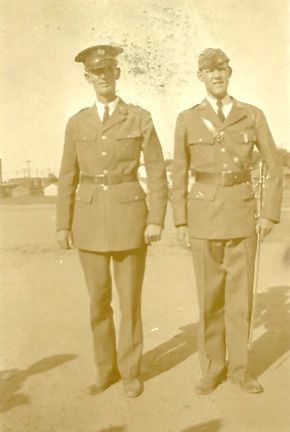
First Sgt. G.W. Wolff and Colonel Francis Howell
But I plunged into my studies in high school, and from the beginning (if I may so modestly say) I excelled; particularly in Mathematics, Machine Shop, and starting my sophomore year, Military Training (ROTC). Our instructor was First Sergeant G.W. Wolff. Sgt. Wolff had been a Lieutenant Colonel in Europe in World War I. He had been wounded several times, decorated several times, and had lost a lung to poison gas. The way he bellowed, we cadets were glad he only had one lung. Being the romanticist I was, I ate military education up. My junior year I was on the firing team and did quite well for shooting ?wrong-handed? as Sergeant Wolff said. I had to shoot left handed because of my eyes. I recall one of my shop teachers was a pilot in the National Guard and on weekends would take us out to Stout Field and take us up in the old open cockpit observations planes, and once, to our thrilling surprise, took us up in an old B-10 bomber. To show you the diversification of people Dad knew the full-time line chief at Stout Field was an old Master Sergeant that Dad grew up with. On Decoration Day, Army planes from all over the country would fly into Indianapolis. While the pilots would go to the Indy 500, the old line chief and his crew would service the planes and let me sit in the cockpit of planes like the P-6 and the P-26.
I wasn?t large enough for any sports at high school until my senior year when I finally reached 5?8? and 153 pounds. I went out for football, but without any previous varsity practice, I only got in a few minutes of playing time in the second half of one game in which we romped over Carmel High School 104-0. In the spring I went out for track and ran the one-mile and the two-mile. I was too small ?for the sprints. I didn?t do too bad though as I set a school record of just under five minutes for the one mile.
I was still a loner though. Of the two dances I went to, I took your Aunt Beth. I recall my graduation outfit cost $20.00 (and that included a snap-brim fedora). I made National Honor Society, Minuteman Club (Senior Boys), and received a one-year scholarship to Indiana University. I graduated in 1935 during the heart of the Depression.
?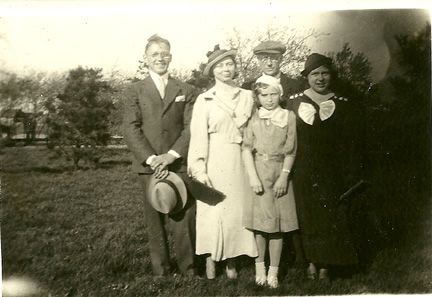
Dad, Aunt Beth, their Dad, Aunt Hazel, Aunt Marian in front at Dad?s High School graduation
Dad was on WPA during the Depression. I recall one job he had. Part of the levee on the East side of the White River between Tenth Street and Washington Street was built literally by hand. Long lines of hundreds of men pushing wheelbarrows would progress slowly by more hundreds of men with shovels who would shovel dirt into the wheelbarrows. The men with the barrows would never stop walking. After the barrows were partially filled they would push them to the top of the levee; dump them, and return down to the bottom for another load. Round and round they went. Being literate, Dad stood at the top of the levee and counted the loads of dirt being wheeled past him. So much for education.
Starting my sophomore year in High School, I would work on a farm all summer, for what we laughingly called ?25 cents a work and keep.? In other words for room and board; sometimes a little spending money; sometimes a pair of shoes; we would work at least six days a week from sun-up to sun-down (seven days if there were cows to milk) in the fields; planting, cultivating, mowing, harvesting, and every other farm chore in the book. Sometimes I would get Sundays off and if I had the money would take either the bus or interurban back to Indianapolis. Sometimes the farmer would take me in on Saturday night and pick me up Sunday afternoon. Sometimes if it were less than 10-15 miles outside of Indianapolis I would walk. I recall one time riding the interurban in from Mooresville when it hit an old farm truck, killing the farmer and his wife. That same year during haying season, the neighborhood haying ring was cutting hay at John Dillinger?s father?s farm, the day after John was killed in Chicago by the F.B.I. I remember the old man being called into the house to answer the telephone. Returning tot the hayfield, he got back on the mower and continued mowing like nothing had happened. We didn?t find out till noon that John was dead.
After my senior year, I hired out to a tomato farmer just south of Indianapolis. I was getting five dollars a week plus room and board. An average days picking was 100 hampers, or half bushels, per picker. Then they had to be loaded on an old Model-T truck and taken into town to the cannery. I hated the picking but loved to drive that old truck. About half way through the season, I found out the old farmer was paying other pickers 3 cents a hamper, plus room and board, so I quit and hitchhiked to Kansas and hired on with a threshing gang then that would slowly progress northward through Nebraska and on up into the Dakotas. The work was hard, but the pay was better then I could get any place else, particularly when I finagled my way into being a relief driver on the big grain trucks. I missed Dad though.
I left the harvest fields after a couple of months and went back to Indiana with one of the fellows who had his own car. After a few days at home, he picked me up and we drove down to Texas to the oil fields around Odessa. I got a job with the explosive?s gang (they were the ones whose job is to bring the charges down the well.) The little charges were called ?pencils? of nitroglycerine. Perfectly safe? (At normal body temperatures). ?So safe, in fact they could be carried in an inside jacket pocket. That job lasted eleven days. Two of us had been sent to Austin to get a supply of nitroglycerine. The trucks we drove were specially designed for the job. The front of the bed was thick steel and the container of ?nitro? was suspended in a cradle in the center of the truck. The cradle was insulated from the truck by thick shock cords attached to the eight corners of the truck. Consequently, as the boss said jokingly, if the nitro did blow, it would blow out the back of the truck. To myself I thought, ?Yeah, just like a rocket.? My buddy took off first, and I followed about ten minutes later. Some distance northeast of Austin in the panhandle, I felt my truck shudder a little. Starting to slow down I saw a cloud of dust mixed with flames cover the road a couple of miles ahead. Slowing to a stop, and pulling off onto the berm, I locked the truck and ran up to the scene of the excitement. There was a sizable crater in the road and debris was scattered for yards around the scene. It was obvious that my buddy?s truck had exploded. I later found that another truck had tried to pass him, and sideswiped him enough to bounce his truck into the ditch and back onto the road before the nitroglycerine exploded. In any event, I handed my truck keys to the State patrolman who arrived about that time, told him to how to get in touch with my boss, and hitchhiked back to Indiana. The fact that I had two gallon more of nitroglycerine on my truck then my buddy had had may have influenced my thinking a little.
Several months later I had another experience with a load of explosives that cured me to a large extent. Work just wasn?t available in Indianapolis. Dad had finally gotten off the shovel gang and was working in the WPA garage. He came home one evening and told me that they were looking for an experienced truck driver. The man left his card with Dad and Dad passed it on to me. I called the next morning and was invited in for an interview. ?The job was hauling explosives from a factory in Chicago to Jeffersonville Proving Grounds in Southeastern Indiana. Mostly dynamite but sometimes military ammo. That job lasted for a shorter period of time than the one in Texas. I had been loaded with twelve ton of dynamite and detonator caps. Perfectly harmless ? when kept apart. It was roughly a nine hour trip. In any case, after I had backed into the unloading dock at the depot, I went up on the dock to watch the men unload. As they opened the doors, I sensed something was wrong as most of them promptly scattered, running off in all directions. Looking at the boxes in the rear of the truck I saw why. The boxes were marked ?Capped Dynamite Handle with Care.? Every bit as lethal as plain nitroglycerine. Finally, after carefully unloading the truck, I drove it back to Indianapolis, parked it in the company parking lot, collected my pay and walked home. I wasn?t about to see if the third time was a charm. After all, I wasn?t even 17 yet.
Starting in December of 1935 I got a job at a factory just a few blocks from the house that made metal parts such as fenders, doors, etc. for various truck manufacturers in Indiana. I was assigned to the Shipping Department loading either boxcars or trucks. Since I was underage, I had to lie about my age. They weren?t too particular though, as they were a couple of boys younger than I hired at the same time. The pay was a magnanimous $.40 an hour. Since it was seasonal work, there probably would not be more than six or seven months a year, but anything was better than nothing.
Since the longest period off from work would be in the summertime, I was considering going back out and working the harvest fields. But this was the start of the ?Dust Bowl? era in the Midwest, so I had to cancel those plans. In fact, at the height of the ?Dust Era? a couple of years later there were times when even Indianapolis would be affected by the dark dust clouds. I vividly recall one day, it got so dark around noon that they had to turn on the street lights. Street corner evangelists were predicting the end of the world.
So instead of working in the harvest fields, I went to Fort Knox, Kentucky with the National Guard for maneuvers with the Second Field Army. As soon as I turned 17, I had joined the 151st Medical Detachment of the 38th Division in Indianapolis. ?Things were quite casual in the National Guard at that time since they had not started forcing employers to let guardsmen off for drill or summer encampment. If you could get off good, otherwise call or write. You could even get suspended service, if you wanted to leave the state for a year or so. With my high school ROTC background, I didn?t even have to take Basic Training. All other training, including Medical training, was in the field.
To briefly finish the story on the National Guard, the 38th Division was Federalized in January 1940, and my unit was finally called up about a year later. Since this was before Pearl Harbor, I couldn?t go on active duty because I wore glasses, so I was released. It took me until 1942 to finally go on active duty.
Not much happened between 1936 and 1938. I continued working part time at the Metal Auto Parts Company. I became a charter member of the United Auto Workers Union when it was formed. They got us a whole ten cents an hour raise (up to $.50 an hour). In addition, I got part-time work driving semis ?over-the-road?. Since this was before the time the ICC cracked down on driving time, we could drive as many hours a day as we wanted to, so I did. Dad and I also ran an auto-repair service in our backyard (since we didn?t have a garage). We couldn?t do a whole lot obviously but we did manage to pick up a few jobs. I remember one in particular because of the weather. Dad had agreed to put a new clutch throw out bearing in this old Chevrolet coupe. However, Dad was sick so I talked him into letting me do it under his supervision. There are several ways to do this but the fastest was to jack up the rear end of the car, undo the shackle bolts holding the rear axle to the springs, drop the wheels back to the ground, and then unfasten the front of the transmission, and slide the whole thing back. In those days, you could work on the transmission by taking up the floorboards in the driving compartment so you didn?t have to get under the car. After sliding the transmission back off of the drive shaft, you lowered it to the ground. This then left the clutch and throw out bearing fork exposed. This particular throw out bearing was a sintered bronze ? graphite ring about three inches in diameter, and cost nine cents at the Western Auto down by the high school which was about two miles from home. Since it was wintertime, and since we couldn?t afford permanent antifreeze for our cars, we always drained the radiators at night to keep them from freezing up. Not wanting to take the time to fill the radiator, I walked down to get the bearing and walked back. Anyway, I replaced the bearing, put the car back together, and drove it a few blocks to the owner?s house. There I collected the $5.00 for the job (of which I got to keep a dollar) and walked home. Oh yes, the weather was five below zero.
In the fall of 1938, I joined the Civilian Conservation Corps for six months. ?The CCC was established to give young men a job; with some pay, but mainly room, board, and clothing. Camps were established all over the country. They were set up for the most part by Army Reserve officers. I was assigned to the CCC Company at Woods Cross, Utah, which is a few miles north of Salt Lake City. We traveled by troop train from Fort Benjamin Harrison in Indianapolis to Fort Douglas, Utah where we transferred to trucks for the ten-mile ride out to Woods Cross. There we processed in, ate supper, and got back on the trucks. We were taken back to Fort Douglas we were put back on a troop train and went to Oregon to fight forest fires. Two long hard weeks later, we finally got back to Utah. It was in Oregon that I learned to drive a bulldozer. It certainly beat the axe, saw, or shovel gangs.
Shortly after getting back to Utah, the Company Commander decided he would enter a boxing team in the Intermountain A.A.U. Tournament since the Regional Championships were to be held at Fort Douglas. My older step-sister?s first husband had been a semi-pro boxer in Indianapolis and I had sparred around with him a little bit, and had even helped him train. Obviously not much, at my age. In addition, I had been involved in a couple of brawls in high school. One in particular I remember because of the circumstances. At high school football games, the ROTC students would patrol the fences around the athletic field to keep people from climbing over the fence, thus getting in to see the game for free. Anyway, this one game one of the school bullies, a boy by the name of Joe Pittman, decided to climb over the section of fence I was patrolling. Then he was going knock me down and in the confusion his buddies could then climb over the fence and escape into the crowd. Well Joe sidled up to me and swung at my chin. I jerked my head back and swung a left at his face which smashed his nose. Stumbling backward, he tripped over his own feet and fell flat on his back. As he started to get up, he realized that blood was pouring out of his nose and to everyone?s surprise, he started crying. So much for big, bad Joe. Needless to say, by the next day, the school was a buzz with how that little Wilson kid had pummeled the big Pittman kid. (Actually he wasn?t that much bigger then I was.) One further repercussion was that since I lived in the ?Valley? in West Indianapolis and Joe lived in the ?Hill? part of West Indianapolis, obviously all the stories about the Valley being so tough just had to be true.
But back to the boxing team. Three other fellows signed up in the Middleweight class with me. The first fight, at the opening bell, this kid came charging across the ring at me and ran into a left swing that decked him for the count. My second fight took two punches and the third fighter quit before the bell. Three punches and camp champion. In the Regional Matches, my first opponent was shadow-boxing in his corner, hit the ring post, and broke his hand. Mine by default. My second opponent lasted a half a round. My third opponent fell three times in the second round, so I got the decision by TKO. I?m still not sure that I hit him that much. He was just plain clumsy. The finals were in Reno and two of us from Woods Cross were on the final team. Of my three fights, I won one by a knockout and two by default. (Really scared them I guess.) Oh yes, our other fighter also won in the heavyweight division.
All of this happened in the first two months of my enlistment. In addition to the boxing I was promoted to Assistant Educational Advisor (probably because I had graduated from high school) and was teaching reading, writing, and arithmetic to a group of illiterate kids from either the coal mines in Pennsylvania or the steel mills in Gary, Indiana. I was also Acting First Sergeant since I was the only person who could pronounce some of the Polish or Slovakian names.
There was a regulation in the CCC?s that you could get time off from camp duties if you had a part time job. I really bent that regulation, because I took a part time job driving a semi for a Medical Supply Wholesaler in Salt Lake City and was soon making fairly frequent trips to Denver, San Francisco, San Diego, and Los Angeles. I was driving a Mack cab-over-engine tractor with a 28 foot dual truck trailer. Most of my runs were into Los Angeles where the company maintained a sleeping room close to the warehouse for truck crews. Fortunately, it was only a couple of blocks away from the Olympic Club, one of the biggest boxing arenas in L.A. It didn?t take me long to start hanging out there and even less time to start working out sparring. From that to preliminary bouts on their almost nightly boxing card was but a short step. In just a couple of months I had complied an amazing 17-0 record. I had as many as three prelims a night, and fought under so many different names at first, I couldn?t remember them all. (You were only supposed to fight once a week.) By then I had progressed up to semi-final bouts (5-7 rounds). Finally, the club manager thought I was ready for the finals. Most of theses were ten-rounders, but if it was a non-title bout they could go twelve. ?Sonny? Wilson was putting his undefeated record on the line against the former middleweight champion of Mexico. Unfortunately he hurt himself training, so the club signed the former Middleweight Champion of the Navy (seven years running) with a 147-3 record to replace him. They told me I was knocked out in the fourth round, but I honestly don?t remember anything after the first half of the second round.
Fortunately the bells had stopped ringing and my cracked ribs and broken nose hadn?t started hurting too bad the next morning because I had to drive to San Francisco, change loads, and start the return trip to Salt Lake City. Needless to say, it was an agonizing trip. To top it off the boss fired me when I got back to Salt Lake City because he didn?t approve of prizefighting. Oh well, my six months were about over anyway and I missed Dad.
One regulation in the CCC?s was that you had to stay out six months before you could reenlist. The six months I was out was interesting in that the U.S. Government had found a large number of World War I vehicles still in their overseas crates in several warehouses around Indianapolis. Included were old Liberty chain-driven solid-tired trucks equivalent to the present four-by-fours, Dodge ambulances, and Dodge staff cars. These were hauled to the WPA garage where Dad was working at that time. The mechanics assembled them and got them running. The government then sold them with the ambulances and staff cars going for $20.00 and the old Liberty?s for the outrageous price of $30.00. These vehicles had been found when I was in Utah so by the time I got home the streets of Indianapolis were liberally sprinkled with dozens and dozens of World War I vehicles.
As soon as my six months waiting period was over, I reenlisted and was assigned to the CCC Company at Bluffton, Indiana, up close to Fort Wayne. However, while being processed at Fort Harrison, I was called into Headquarters and told that Dad was in critical condition in Methodist Hospital in Indianapolis. Having no money, I walked from Fort Harrison to Broad Ripple where I called a friend to come pick me up and take me to the hospital. Dad had been working for a few weeks as a driver on the drive crew at the Chrysler distribution in Indianapolis where he had worked before the Depression.
?New cars in those days were picked up at the factory in Detroit by gangs of drivers who would drive one car and tow another behind it. They would drive to Detroit one day in a seven-passenger sedan, spend the night, and return the next day with thirteen new cars. The boss would drive the ?drive? car back bringing a new car behind it.
Dad had been fighting ulcers for years and his health had been deteriorating. In any case, according to the surgeon at the hospital, Dad?s ulcers had apparently ruptured on him in Detroit. Nevertheless he drove himself back to Indianapolis the following day, picked up his car, drove to the hospital, and parked his car before he collapsed. Although they operated immediately, general peritonitis had long set in and without antibiotics there was no hope. Dad died two days later, the day before his 57th birthday.
All of the bitterness and resentment towards my stepmother and her children that had been building up for years exploded the day after Dad?s funeral when in response to some remark from my stepbrother, Bud, I jerked open the front door grabbed him by one arm and his belt in the back and physically threw him through the screen door where he bounced on the porch and rolled into the front yard. I told Maggie in no uncertain terms that if she said one word, she would join him. Fortunately for me, other then being bruised and sore, Bud wasn?t hurt. I packed all of my possessions and as much of Dad?s stuff as I could into my car and drove over to Widow Koontz?s house and made arrangements to room and board with her. She had been married three times and had five children from various marriages.
Shortly after moving in, I was offered the job that Dad had, of being a driver. This job lasted 3 months. One morning early as I was starting to walk to work, I passed out halfway through the backyard, and woke up in the hospital where they were prepping me for an emergency appendectomy. My appendix ruptured while the surgeon was removing it. I remember the operations for several reasons. One; there was a young nurse administering the anesthetic, which in those days was ether. They would roll a small towel into a funnel shape, invert it over your nose and mouth, and drip the ether from a small can into the towel. By breathing deeply, you would then inhale the fumes. Normal quantities was one to two cans. However after two cans, the doctor started the incision and startled when I told him I was not only awake, but felt the knife, or scalpel really. Two cans later, he started again, and I again told him I felt the scalpel. Seven cans later, he operated. Because of the massive overdose of ether, the hospital personnel were working on me for several hours to try to bring me to. Not being sure they could revive me, they notified my sisters and Mrs. Koontz to get to the hospital. It was almost midnight before I finally came to. I almost hate to say it, because it sounds so far fetched, but I recall having a typical ?out-of-body? experience complete with a long tunnel with a light at the end, and shadowy figures, one of whom I was sure was Dad. Finally I remember reaching the light at the end of the tunnel and it was your Aunt Hazel?s face bending over me. She was calling my name.
I was in the hospital almost two weeks and established a good relationship with two of the nurses. In fact, one of them, Flossie Bradbury, actually cried when Beth and her fianc? Julius Spanovich picked me up and took me back to Mrs. Koontz?s house. By the way, Julius was an airplane mechanic in the Army Air Corp. He went to the Philippines just before Pearl Harbor, was captured by the Japanese, and died in a prison camp in Fukuoka, Japan.
After I recovered I got a job with the Hoosier Outfitting Company, a furniture outlet store in downtown Indianapolis. It was on Washington Street across from the old Courthouse where the present City-County Building is. It was a few doors east of Alabama Street. Across the alley behind us was the County Jail (made famous by Dillinger having escaped from it.) Across from the jail was Police Headquarters. In just a couple of months I was promoted to shipping clerk and warehouse foreman. I worked at Hoosier until I went into the service in mid-1942.
I used to walk to and from work to save money. On the way home from work, I would usually stop in a drugstore just around the corner from Mrs. Koontz. This one evening, I was later then usual. Just as I started into the drug store, this young black man brushed by me and started running down the street. The druggist yelled at me to stop him, and off I went. Unfortunately, he had an accomplice in a car around the corner and got away. Going back to the drugstore I was horrified to find out he had robbed the store at gunpoint. ?The next day a detective Sergeant, by the name of Plez Jones, came over to the store to interview mw. I remember Plez asked me what I would have done if the kid had pulled his gun out and shot at me. Without thinking, I replied, ?I?m not afraid of any black S.O.B.? Plez roared with laughter. You see Plez was black as the ace of spades and uglier than sin. Finally after he stopped laughing, he said that if I was going to chase store robbers, the least I could do was join the Police Department. For some reason that thought appealed to me and a couple of days later while eating lunch in a caf? on the corner, the Chief of Police, Mike Morrissey, walked in for his lunch. I had known Mike for years since he and Dad had grown up together on ?Irish Hill? in South Indianapolis. After lunch, I told Mike what Sergeant Jones had said. I remember he looked at me thoughtfully for a few minutes and finally said, ?Yeah, maybe Frank would approve.? So it was arranged. I would leave work at five in the evening walk down the alley and across the street to Headquarters and go to school until nine. Then I would walk home. After about two months of this schooling and work out (my first exposure to ju-jitzu) they gave me a physical preparatory to putting me out on the streets for more training. Their minimum height requirement was 5?9?. I was 5?8? ?. Oh well, who wanted to be a cop anyway.
Another thing happened while I was at Hoosier, before the war started, that was going to have a long-reaching and long-lasting effect that at that time didn?t really mean that much. As warehouse foreman, I was in charge of the furniture and appliance repair people. ?We had a young fellow working on radios that was a real cracker jack. Also he liked having me around and would even let me do some of the minor repairs after hours. Zenith had just come out with a line of radios that had a large complex dial mechanism that could be used to pre-program the radio (same function as the present VCR?s) so that your favorite soap or news program would come on without you having to turn the radio on. The sheer complexity of this mechanism made it break down quite frequently. Some of the time it could be fixed, but most of the time we just replaced the entire assembly and sent it back to the Zenith plant in Chicago. Any way, to make a long story short, the repairman and I found out that there was a single wire-wound resistor in the unit that would breakdown under a voltage surge and ?saturate.? After this saturation buildup, it would then discharge sending a voltage pulse through the unit, and would continue cycling like this until turned off. By remembering this when I was down at Keesler Field in Mississippi, I got my introduction to Colonel Donovan and his O.S.S. But that comes later. Needless to say, the Zenith people were well pleased to hear the results of our learning, and by changing just this one component saved then thousands of dollars in service costs.
After a while I got tired of the long walk to work, and since I was now without a car, I decided to move to a one room efficiency apartment about seven blocks from downtown Indianapolis. I was living there when the war started. I remember listening to the news that Sunday morning and then walked out to the Romers where Beth was staying and sitting around there until late that night. There was already a line at the Recruiting Office in the Federal Building early the next morning when I got there. After milling around there for a while, the recruiting people finally came out and recorded our names and addresses and told us to go on about our business and they would get in touch as soon as they were ready to start processing. It was the middle of January before they got around to calling me. After a farewell party at work, I vacated my apartment, gave my furniture to Beth, and arranged to store my stuff with her. At the Examination Center they hemmed and hawed around and finally decided to reject me because I wore glasses. I arranged to stay with the Romers until I could appeal the rejection and get my case reviewed. I went back to work at Hoosier having missed only a day-and-a-half of work. It was early summer before my appeal came up and I was reexamined for service. This time I passed even though I was just out of bed from a bout with lobar pneumonia. In August 1942 I was sworn in and sent to Keesler Field, just outside of Biloxi, Mississippi, for Basic Training.
? ?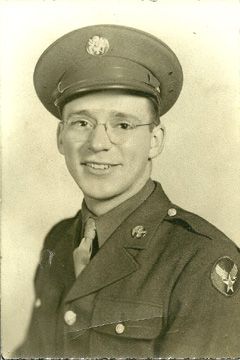
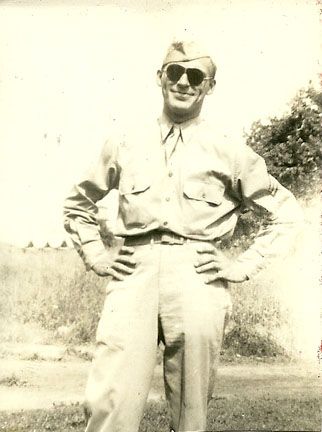
Dad in uniform in World War II
Halfway through the first week of Basic Training they got around to asking if any of us had any previous military training. When they found out I had three years of High School ROTC and six years of National Guard training, I was jerked out of the ranks and made a Drill Instructor, posthaste. Not only that, but after two days of introduction, I was put in charge of the platoon I had been a member of Since we really had no rank, we were made ?acting? Sergeants. The chevrons were sewed on a dark cloth armband that we pinned to our jacket sleeves. We did have the privileges of Non-Commissioned Officers, we just didn?t have the pay. Fortunately one of the privileges was access to the NCO Club where you could get 3.2 beer. Not very potent, but quite refreshing. It was at the club that I got acquainted with a Master Sergeant named Guy Illian. Guy had been in the service since 1932 and was Senior NCO at the Radar School at Keesler. One day I caught him nursing a beer and looking puzzled. He told me that the school had been asked to develop and electronic device that would identify friendly aircraft when their blip showed up on the radar screen. They were looking for something that would give some kind of pulsed signal that could be uniquely keyed to identify friend from foe. For some reason I thought of the trouble we had had with the Zenith radios. When I explained this to Guy he grabbed my arm and yelled, ?Come with me.? Even though Radar School was classified and off limits to uncleared personnel, some of the offices and labs were not. Going to one of these labs, Guy had me give a detailed description of what I had just told him while he started connecting electronic components and instruments together. Putting a blip on the screen by electronic simulation, he attached the output of his mock-up to the simulator, and we watched the blip flash in sync with the pulsing action. A few days later the School Commandant requested my presence at a demonstration to be given to some visiting ?firemen? from Washington. In addition to the CO, Sgt. Illian and myself were a half-a-dozen other people only two of whom were in uniform. One was an Air Corp Major General, and the other was a Signal Corps Colonel. ?Guy explained to the group that since I had given them the idea, the CO and he felt I should be present. He then proceeded to demonstrate the device. Every one appeared satisfied, particularly one husky older individual that Guy told me afterwards was a Colonel Donovan. At that time, the name meant nothing to me. The CO said something about trying to get my assignment changed so that I could go to Radio School at Scott Field and then come back to Keesler to Radar School. I didn?t have the heart to tell him I was getting sick and tired of Keesler and would do almost anything to keep from being reassigned there.
About two months later, one of the PE instructors, another DI and I were sent to Fort Belvoir, Virginia on a temporary assignment that for some reason was classified. I later found that the only reason for the classification was to prevent embarrassment to some of the individuals involved. It seems that as the U.S. Government was bringing more and more people into Washington as they geared up to run the ?War Effort?, that as per custom, they were passing out military ranks to these people compatible with the position they were to fill. For example, the Chairman of General Motors, Charles Wilson, was brought in to coordinate wartime production and was given the rank of Lieutenant General. Unfortunately most of these men had never had any military training, so the three of us were brought to provide the rudiments of military training and military courtesy to them. They probably figured we would be less apt to talk than the personnel assigned to Belvoir. It was hilarious to see the staff cars and limousines coming out in the morning, deposit these people, and return in the evening to take them back to their quarters. For eight hours a day they were ours, and we really put them through their paces in a conscientious effort to make soldiers out of them. After three weeks, the PE instructor and I were unceremoniously sent back to Keesler. It seems we were too hard on them.
After five months at Keesler I was finally sent to the Radio Operator ? Mechanics School at Scott Field, Illinois. Sixteen weeks later I graduated but was retained as an instructor.
To get back to Belvoir for a minute, one day while putting my troops through their paces, an Army Colonel who had been standing there watching for a while, came over during a break and said, ?Your device worked like a charm, Wilson.? It was Colonel Donovan. I was told later on that he was the head of the recently organized Office of Strategic Services. So you see, I did meet ?Wild? Bill Donovan, and did do some work for the OSS. So I exaggerated a little. As Jerry would say, ?Well excu-u-u-se me.?
I remained at Scott for almost two-and-a-half years. After about a year instructing, I was assigned as a Communication Specialist to the Air Inspector?s Office. I was part if the team investigating accidents, slow-downs, or just plain SNAFU?s. My role was to see what part, if any, communications played in these events. I enjoyed this phase tremendously as I got to work on the flight line with all types of multi-crew aircraft. Furthermore, I got myself qualified as a Communication Security Specialist. This gave me three active MOS?s; Radio Operator, Radio Mechanic, and CSS.
Early in 1945, I was ordered overseas, and started processing in April of that year, and finally got to Tinian in early June just in time for the final accelerated bombing of Japan that culminated in the atomic bombing in August of 1945.
Just a few of the highlights of the trip over. I had my final processing at Fort Lewis, Washington and was loaded on a Liberty ship at Tacoma. Because of all my MOS?s, I was armed fit to kill. As an Airborne Operator, I was issued a .45 automatic and a .38 short barrel pistol as part of my survival kit. As a Mechanic, I was issued a Garand. Finally as a Communications Security Specialist, I was issued a M1A1 Carbine. Talk about Rambo.
As we left Puget Sound and got into the Pacific, we ran into a violent storm that lasted three days. Consequently, we missed the convoy rendezvous and had to continue to Pearl Harbor alone, hoping there were no Japanese submarines in that part of the ocean. All 500+ GI?s were seasick, all the Navy gunners were seasick, and a large part of the crew. After all the good old USS Lindley M. Garrison could roll 45 degrees in calm waters or so it seemed. The Captain and the first mate were the only completely ambulatory people on the ship. At the risk of sounding phony, I want to describe the first mate. He was about 5?6? in height, and weighed better the 225 pounds. He had a small mustache and always wore a soft cap. His primary distinguishing feature though was he had an honest-to-God peg-leg. But he pulled the GI?s through almost single-handed. Helping us to and from the rail, laughing, joking, teasing in a good natured way. In the sleeping areas below deck, the bunks were five high. Consequently you couldn?t sit up in your bunk but had to roll in and out. After the first night, because of the stench, most of us slept on the deck rolled up in our ponchos under whatever shelter we could find. All in all, it took us nine days from Seattle to Pearl Harbor. Even after the storm stopped it took another couple of days for the waters to subside. About that time, the crew discovered that one of the meat lockers had malfunctioned and the meat had all spoiled. Nothing to do but get up a work crew of everyone at least partially ambulatory, have them go down this circular stairs to the meat locker, pick up a crate of the meat, go back up another set of winding stairs to the main deck, and throw the case over the rail. First off, it was mutton, and fresh mutton smells bad enough, let alone after it has rotted. So the procedure degenerated to this; we would pick up a crate of the meat, stagger up the stairs, stagger to the rail, heave the crate over the side, heave after it, and then stagger back down the stairs. And there was seven tons of the damned stuff. Any adjustment we had made towards getting over our sickness was effectively negated by this episode. We probably attracted every shark in the Western Pacific.
After a few days on Oahu for jungle warfare training we proceeded on to Tinian. The services were starting to amass a potential invasion fleet in the Marianas at this time. The two mile channel between Tinian and Saipan was virtually shore-to-shore ships of all types. My original orders had been to join an advanced B-29 base on Okinawa, but 20th Air Force Headquarters changed them to keep me on Tinian and assign me to one of the Groups in the 313th Bomb Wing. I eventually ended up in the 6th Bomb Group, but was bounced around from Squadron to Squadron and eventually wound up in the 24th. The group of us coming in at that time were designated as combat replacements, and the several qualified Radio Operators in the group were used as substitutes. Consequently, we seldom flew with the same crew twice. All in all, I got in seventeen missions before the end of the war with a large part of them being on planes that dropped mines in the Shimonoseki Straits, the main Japanese ship channel. The usual mission was about seventeen hours.
After the fighting stopped I got in on a prison camp search mission. This involved flying to Japan, then over to Kunming, China and back to the Marianas. Monotonous, to say the least.
After the fighting stopped, the next major event was the typhoon in October of 1945. I had just been transferred to the 24th Squadron and had just moved my gear into a 16-man squad tent while awaiting the construction of a pre-fab barracks when the storm struck late in the afternoon. I was tired and had just laid down for a nap when the wind velocity started increasing. I put my gear beside me on the bunk wrapped my poncho and shelter-half around the whole thing (including me), and dropped off to sleep. Some of the idiots were actually holding on to the tent ropes while the tent was trying to get airborne, which it finally did. I w
Source: http://www.dailykos.com/story/2013/01/13/1178563/-My-Dad-Was-A-Part-of-The-Greatest-Generation
ghost hunters lightsquared david lee honduras prison fire do not call list sports illustrated westminster dog show 2012
No comments:
Post a Comment
Note: Only a member of this blog may post a comment.